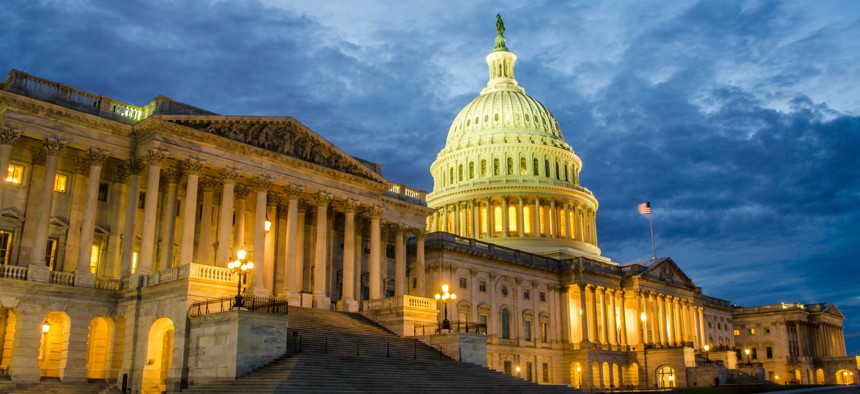
The Homeland Security Department's Countering Weapons of Mass Destruction office will lose its authorization on Feb. 3, barring Senate action. Marc Dufresne / Getty Images
House moves to save DHS office, and hundreds of jobs, from elimination
The Senate has just a few months to take action or the office will shutter.
The House on Tuesday approved a measure to reauthorize a Homeland Security Department office that absent congressional action will cease to exist in the coming months.
The Countering Weapons of Mass Destruction office within DHS is set to see its authorization expire early next year, a little more than five years after Congress codified it and lawmakers extended its life as part of a recent stopgap funding bill. The House unanimously passed an extension bill in a 394-0 vote on Monday, sending the measure to the Senate that would keep the office functioning for two more years.
The office maintains an annual budget of $400 million and works closely with DHS components, as well as state and local law enforcement, to help them detect and prepare for chemical, biological, radiological and nuclear weapons. It conducts large-scale procurements and has 56,000 personal radiological devices in the field that assist in detection, including 40,000 within DHS and 16,000 at state and local entities. It also maintains larger devices that go into trucks, SUVs, planes and boats that can detect any nuclear material in an area, which DHS deploys for major events like the Super Bowl or the Macy’s Thanksgiving Day Parade.
The Biden administration has lobbied key lawmakers and issued warnings to stakeholders and the media, explaining key trainings, detection equipment and funding will not be available if Congress fails to act. Jurisdictions such as Los Angeles and New York City have written letters and lobbied their members of Congress to save the office, noting its importance in helping them plan for and operate in big events.
Reps. Mark Green, R-Tenn., and Anthony D'Esposito, R-N.Y., who respectively chair the House Homeland Security Committee and its emergency management panel, on Tuesday called on the Senate to pass their bill "without delay" to ensure CWMD does not experience any lapse.
“Last night’s passage is a major step forward in promoting collective readiness for chemical, biological, radiological, and nuclear threats against this nation and ensuring community resiliency in the event of a homeland security crisis of high magnitude,” Green and D’Esposito said. “As the threats to our nation grow more complex, it is crucial that DHS equip our communities with the necessary tools to keep them safe and fulfill its mission to secure the homeland, as well as provide a clear, coordinated response to threats of weapons of mass destruction.”
CWMD buys equipment in bulk so components and localities can purchase them at lower rates, and then deploys its experts to train officers on how to use them. The office employs more than 230 people, ranging from nuclear physicists to biological engineers to veterinarians, as well as 400 contractors.
Those jobs are now hanging in the balance as employees await Senate action. The office has engaged in contingency planning for its workforce in the event its authorization expires. Assistant Secretary Mary Ellen Callahan, who leads the component, recently said she is hopeful it can avoid any layoffs, noting other DHS leaders have been instructed to leave vacant any position that a CWMD employee could fill. The department is hopeful it will be able to present three options to each affected worker at the same series and grade as their current roles.
“People are anxious,” Callahan said in October. “They have a sword of Damocles hanging over their head.”
CWMD has endured low morale since its 2018 founding, when, according to officials, offices with clashing cultures were brought together. In the most recent Best Places to Work in Federal Government rankings, as compiled by the Partnership for Public Service based on Federal Employee Viewpoint Survey data, the office ranked 430 out of 432 subcomponents.
The House-backed bill would require CWMD to create and report to Congress on plans to improve employee engagement and morale. The same provision was included in a CWMD extension bill the Senate Homeland Security and Governmental Affairs Committee approved earlier this year. That bill did not include a sunset provision for the office and goes into more detail on its role and responsibilities going forward. Sen. Gary Peters, D-Mich., has introduced a largely similar two-year CWMD extension bill in the Senate. Peters is committed to ensuring the office can continue its vital functions without interruption, a committee source said.
CWMD officials said they will likely be forced to send out employees to other DHS components before the deadline, now Feb. 3, if no resolution is reached before then. The office is being careful to avoid a lapse in service for any employees, so it will reassign them before that date. If the office is reauthorized after Feb. 3, it will have no mechanism to then bring them back without first recompeting the jobs.
This story has been updated to reflect the February deadline for congressional action.







